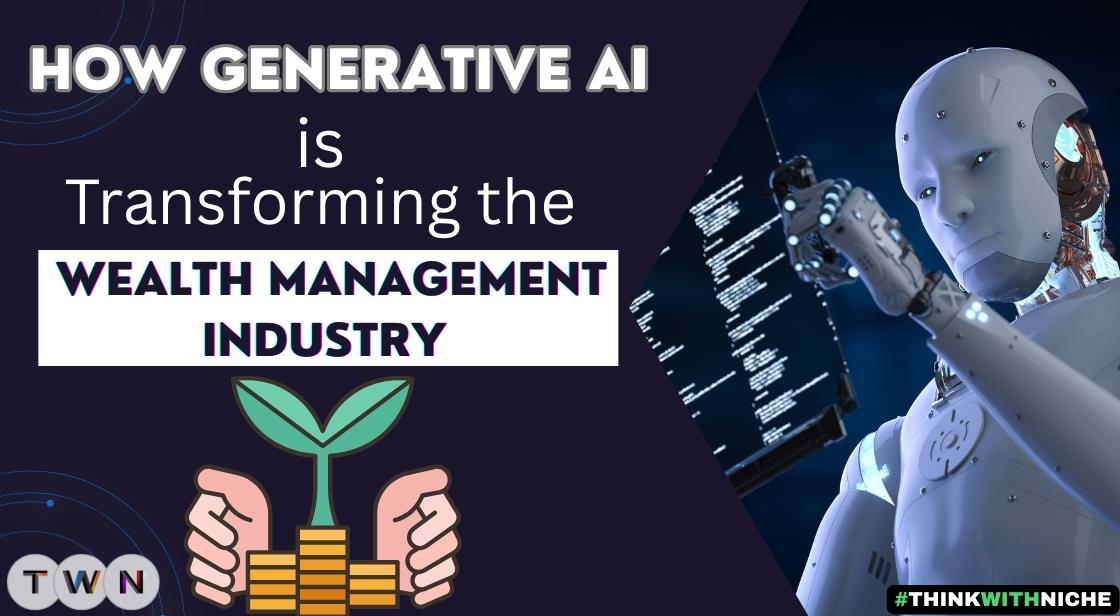How Generative AI Is Transforming the Wealth Management Industry

Blog Post
In an era defined by rapid technological advancement and ever-evolving client expectations, wealth management is undergoing a profound transformation. At the heart of this change is Generative AI (GenAI)—a powerful blend of machine learning and natural language processing that is reshaping how financial advisors deliver services, detect fraud, and build lasting client relationships.
As data volumes grow exponentially and market conditions become increasingly complex, traditional approaches to wealth management are proving insufficient. GenAI is emerging as a game-changer, enabling firms to harness real-time insights, automate decision-making processes, and deliver highly personalized investment strategies at scale.
From enhancing fraud detection to powering intelligent virtual assistants, generative AI is no longer a futuristic concept—it’s a present-day necessity.
This blog explores how GenAI is revolutionizing the wealth management industry, highlighting real-world use cases, measurable benefits, and key challenges firms must address to stay ahead in an AI-driven financial landscape.
Exploring the Role of Generative AI in Wealth Management
A New Era for Wealth Management
The wealth management industry is undergoing a significant digital transformation, and at the heart of this shift is Generative AI (GenAI). Combining machine learning, deep learning, and natural language processing (NLP), GenAI enables wealth managers to make smarter, faster, and more personalized decisions. In a landscape where financial markets move quickly and clients demand real-time, tailored services, GenAI serves as a critical lever for innovation and competitive differentiation.
As global data volumes continue to expand and financial fraud becomes increasingly complex, GenAI equips wealth management firms with the analytical firepower to respond to challenges in real-time, reduce costs, and deliver hyper-personalized client services.
The Rising Adoption of Generative AI in Wealth Management
Recent industry surveys reveal that a growing majority of wealth management firms plan to significantly ramp up their investments in AI technologies. The move is driven by a compelling business need to modernize service delivery, mitigate risks like fraud, and cater to increasingly sophisticated customer expectations. GenAI is emerging as a foundational technology—delivering operational efficiency while enhancing revenue-generating capabilities.
Section 1: Combating Financial Fraud with GenAI
⮞ A Smarter Way to Detect Fraud
Traditional fraud detection systems rely on static, rule-based approaches, which often fall short in identifying evolving fraudulent tactics. In contrast, GenAI leverages real-time data ingestion and anomaly detection to identify suspicious activity with unmatched precision.
GenAI continuously learns from new transaction patterns, user behaviors, and contextual data—enabling systems to flag potentially fraudulent transactions early and accurately. This drastically reduces the number of false positives that can overwhelm fraud investigation teams.
⮞ Real-World Results: Cutting False Positives by 60%
Financial institutions that have adopted AI-driven fraud detection systems report impressive outcomes. In some cases, banks have seen up to a 60% reduction in false-positive alerts, allowing risk analysts to focus on genuine threats instead of chasing red herrings. These streamlined processes reduce losses and improve the efficiency of internal security teams.
⮞ Building Client Trust Through Proactive Protection
The ability to detect and prevent fraud swiftly strengthens client trust and protects assets. With thousands of alerts processed in seconds, GenAI ensures that fraud doesn’t compromise portfolio integrity or brand reputation—making it a cornerstone of modern risk management.
Also Read: The Role of Digital Transformation in Modern Business
Section 2: Personalized Investment Strategies Powered by AI
⮞ Redefining Investment Advisory with Tailored Insights
Personalization has always been essential in wealth management, but GenAI is pushing this concept into a new frontier. By analyzing large volumes of client data—including financial goals, income trends, spending behavior, risk appetite, and real-time market conditions—GenAI can generate personalized investment strategies that adapt dynamically.
⮞ From Static Portfolios to Adaptive Solutions
Unlike traditional investment portfolios, which may be static or based on periodic reviews, GenAI-driven strategies evolve constantly. As market conditions shift or a client's life events change, the system automatically updates the investment approach—offering more agile and relevant advice.
⮞ Tangible Business Benefits: Improved Engagement and Loyalty
Early adopters of GenAI report notable increases in client engagement and satisfaction. These personalized recommendations not only resonate more with individual investors but also foster trust, which is critical in long-term client relationships. Some firms have even observed higher retention rates and revenue growth due to GenAI-enhanced personalization.
Section 3: Elevating Customer Experience with GenAI Tools
⮞ Always-On Support Through Intelligent Assistants
Customer service is another domain where GenAI is making a profound impact. AI-powered chatbots and virtual financial advisors can handle a wide range of tasks—such as updating account information, answering investment-related queries, or providing market insights—at any time of day.
This “always-available” support model ensures consistency, speed, and accuracy—qualities that today’s digital-first customers expect from their financial providers.
⮞ Human Advisors Empowered, Not Replaced
Far from replacing human advisors, GenAI enhances their roles. By automating routine interactions, it frees up time for financial advisors to engage in deeper, strategic conversations with clients. This blend of automation and human expertise results in better outcomes and stronger relationships.
Section 4: Operational Efficiency and New Revenue Streams
⮞ Streamlining Internal Workflows
Generative AI is significantly enhancing operational efficiency across the wealth management ecosystem. By automating repetitive and manual tasks such as data entry, document processing, and compliance checks, GenAI reduces the burden on back-office teams and accelerates overall service delivery.
For instance, AI-powered tools can automatically generate client reports, process onboarding documentation, and even suggest portfolio rebalancing based on real-time market conditions and individual client preferences. This not only reduces administrative delays but also minimizes errors that can result from human oversight.
The integration of GenAI into core processes allows firms to shift valuable human resources toward more strategic, client-focused activities, ultimately improving productivity and performance.
⮞ Unlocking New Business Models
Beyond improving internal efficiency, GenAI is opening up entirely new avenues for growth and revenue generation. With its ability to analyze vast datasets and respond instantly to complex queries, firms can now deliver hyper-personalized services to a wider clientele.
This includes offerings like AI-generated thematic portfolios, real-time risk-adjusted investment suggestions, and micro-targeted financial planning. These innovations make it feasible to serve high-net-worth individuals and mass affluent clients alike without a proportional increase in labor costs. As a result, wealth managers are better positioned to scale their operations, differentiate their brand, and tap into previously under-served market segments.
Section 5: Challenges to Overcome in GenAI Implementation
While Generative AI (GenAI) holds immense promise for revolutionizing wealth management, its successful adoption is contingent upon addressing several critical challenges. These obstacles range from technological limitations to regulatory complexities and operational readiness.
⮞ 1. Ensuring Accuracy and Reducing AI Hallucinations
One of the foremost concerns with GenAI systems is the potential for generating inaccurate or misleading outputs—commonly known as “AI hallucinations.” These issues arise when AI models are trained on incomplete, outdated, or biased data sets. In wealth management, where decisions directly impact clients’ financial well-being, such errors can be costly. Firms must establish stringent human oversight protocols, deploy validation layers, and regularly retrain models with high-quality, structured financial data to ensure accuracy, transparency, and regulatory compliance.
⮞ 2. Protecting Sensitive Client Data
Wealth managers are entrusted with handling highly sensitive and personal financial data. The use of GenAI introduces new cybersecurity and data privacy risks, especially when models are hosted on public cloud infrastructure. To mitigate these risks, many firms are transitioning to private cloud or on-premises AI deployments, ensuring better control over data governance, access restrictions, and encryption protocols.
⮞ 3. Navigating Regulatory Uncertainty
As AI usage in finance grows, regulators are actively working to establish frameworks around model governance, fairness, and explainability. Firms must remain agile, anticipating evolving guidelines and ensuring their AI tools align with fiduciary responsibilities and ethical standards. Investing in AI-specific risk management and compliance tools will be critical.
⮞ 4. Overcoming Integration and Talent Gaps
Integrating GenAI into legacy systems presents both technical and organizational challenges. Additionally, the lack of skilled personnel who understand both finance and AI is a growing concern. Firms must prioritize staff upskilling, embrace strategic AI partnerships, and implement robust change management initiatives to maximize the technology’s value.
Conclusion: The Future of Wealth Management Is AI-Driven
Generative AI is not just a technological trend—it’s a transformative force in the wealth management sector. By enhancing fraud detection, powering personalized investment solutions, and enabling superior customer experiences, GenAI is helping wealth management firms thrive in an increasingly competitive market.
Firms like Morgan Stanley and JPMorgan Chase are already realizing tangible benefits—from reduced fraud exposure and increased advisor productivity to stronger client relationships and innovative investment products. As more institutions embrace GenAI, those that balance innovation with regulatory compliance, data protection, and strategic integration will emerge as leaders.
Ultimately, the future of wealth management lies in combining the analytical brilliance of GenAI with the nuanced understanding and empathy of human advisors—offering clients the best of both worlds.
You May Like
EDITOR’S CHOICE












